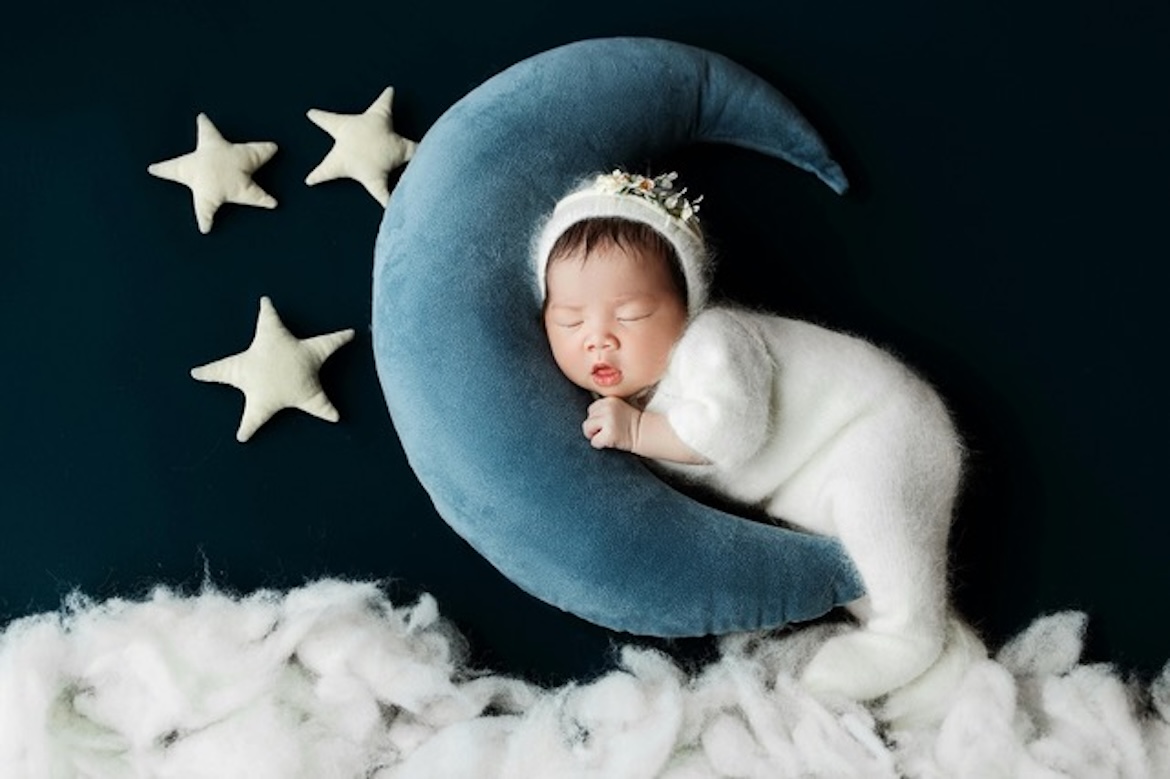The moment a baby is born is unique – not just for parents, but in the sky too. Alongside their Sun Sign, the Moon’s Phase at the time of birth adds another layer of insight into personality, emotional needs and the way they connect with the world.
The Moon moves quickly, completing a full cycle every 29.5 days. That means two babies born just hours apart could have entirely different Moon Phases. Some Astrologers see this as the “emotional fingerprint” of the Birth Chart: the inner patterns, instincts and ways of processing feelings that shape daily life.
Cultural traditions and historical observations have long tied lunar phases to fertility, farming and emotional wellbeing.
From an Astrological perspective, the Moon is linked with nurturing, emotional security and the rhythms of the body. Looking at the Moon Phase your child was born under can offer a new lens on how they experience the world – not as a rigid prediction, but as a symbolic guide.
The 8 Moon Phases explained
Astrologers often describe the Moon phase at birth as the emotional tone of a lifetime. Here’s a quick overview:
- New Moon (0-44°): Pure potential. Fresh, enthusiastic, childlike energy, with a drive for new experiences. New Moon babies often crave new beginnings and instinctively look forward.
- Waxing Crescent Moon (45-89°): Growth and determination. A mix of curiosity and focus, often with a streak of rebellion. Waxing Crescent Moon babies tend to be explorers with a strong drive to progress.
- First Quarter Moon (90-134°): Action and decisions. Dynamic, ambitious, sometimes restless leaders. First Quarter Moon babies thrive on action and challenges.
- Waxing Gibbous Moon (135-179°): Refinement and development. Self-improvers who seek growth through learning. Waxing Gibbous Moon babies aim for excellence and enjoy learning through steady practice.
- Full Moon (180-224°): Culmination and celebration. Relationship-focused, expressive, magnetic. Full Moon babies grow into people who shine through connection and creativity.
- Disseminating/Waning Gibbous Moon (225-269°): Sharing and contribution. Teachers, storytellers, community builders. Waning Gibbous Moon babies often feel compelled to pass on knowledge and connect communities.
- Last Quarter Moon (270-314°): Reflection and reassessment. Questioners of tradition, seekers of personal truth. Last Quarter Moon babies seek truth and often reinvent themselves.
- Balsamic/Dark Moon (315-360°): Rest and release. Visionary, intuitive, deeply reflective souls. Balsamic Moon babies often carry a quiet wisdom and a visionary outlook on life.
These Moon Phases don’t dictate destiny, but they do highlight natural rhythms and tendencies. Parents can use them as tools for understanding – recognising why one child is endlessly energetic while another seems naturally contemplative.
What does it mean if your baby is born on a New Moon?
A New Moon birth is linked with fresh starts and instinctive drive. With the Sun and Moon together, feelings and identity often move in the same direction, which can look like bold curiosity and a strong urge to try new things.
Children born at this phase may grow into self-starters who love beginning projects, learning by doing and discovering what’s next. They can be enthusiastic and quick to act, sometimes before all the details are known.
From a parent’s perspective, these children benefit from gentle structure: clear steps, time to practise new skills and praise for patience as well as initiative.
How parents can connect with New Moon children:
- Encourage new experiences, even small ones, to feed their love of discovery.
- Celebrate their efforts at starting things, not just the finished results.
- Create simple routines so they feel secure when their energy scatters.
- Offer gentle reminders to pause and reflect before rushing ahead.
What does it mean if your baby is born on a Waxing Crescent Moon?
A Waxing Crescent Moon birth suggests focused growth. The Moon has begun to separate from the Sun, symbolising the shift from pure impulse to intentional progress.
Children born at this phase may grow into determined explorers who ask questions, test ideas and rally around causes. They tend to learn well when there’s a goal in sight and a plan to get there.
From a parent’s perspective, these children thrive with encouragement to prepare as well as play: vision boards, checklists and small milestones help channel their drive.
How parents can connect with Waxing Crescent Moon children:
- Involve them in planning family activities so they feel part of the process.
- Encourage their questions, even when they’re relentless.
- Provide creative outlets where they can express curiosity safely.
- Celebrate small wins to help them stay motivated along the way.
What does it mean if your baby is born on a First Quarter Moon?
A First Quarter Moon birth highlights action and decision-making. With the Sun and Moon at right angles, there’s a natural tension that pushes things forward.
Children born at this phase may grow into resilient problem-solvers who enjoy challenges, take the lead and bounce back quickly when plans change. Restlessness can appear if they don’t have a constructive outlet.
From a parent’s perspective, these children benefit from healthy challenges, clear boundaries and space to move their bodies – sport, dance or active play can be game-changers.
How parents can connect with First Quarter Moon children:
- Give them age-appropriate choices so they can practise decision-making.
- Encourage sports or active play to release built-up energy.
- Validate their feelings when they’re frustrated by obstacles.
- Help them balance independence with teamwork by modelling collaboration.
What does it mean if your baby is born on a Waxing Gibbous Moon?
A Waxing Gibbous Moon birth leans toward refinement. As the Moon nears fullness, the focus is on improving what’s already underway.
Children born at this phase may grow into thoughtful learners who love honing skills, asking “how can this be better?” and seeking mentors. Perfectionism can pop up, especially when they care deeply.
From a parent’s perspective, these children do well with supportive feedback: celebrate progress, break big tasks into steps and model self-kindness when mistakes happen.











